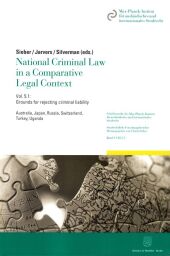 Neuerscheinungen 2016Stand: 2020-02-01 |
Schnellsuche
ISBN/Stichwort/Autor
|
Herderstraße 10
10625 Berlin
Tel.: 030 315 714 16
Fax 030 315 714 14
info@buchspektrum.de |

Konstanze Jarvers, Ulrich Sieber, Emily Silverman
(Beteiligte)
National Criminal Law in a Comparative Legal Context
Grounds for rejecting criminal liability - Grounds for excluding criminal liability - Grounds for terminating or expunging criminal liability. Australia, Japan, Russia, Switzerland, Turkey, Uganda
Herausgegeben von Sieber, Ulrich; Jarvers, Konstanze; Silverman, Emily
2016. XVIII, 410 p. 224 mm
Verlag/Jahr: DUNCKER & HUMBLOT 2016
ISBN: 3-428-15003-1 (3428150031)
Neue ISBN: 978-3-428-15003-8 (9783428150038)
Preis und Lieferzeit: Bitte klicken
This publication is part of the "International Max Planck Information System for Comparative Criminal Law". One of its primary objectives is to develop a universal meta-structure of criminal law that can serve as the basis for the organization of material, enable systematic comparisons, and further the development of an international criminal law doctrine. Towards these ends, a pilot project was carried out to analyze, structure, and present the general part of the criminal law in twelve legal systems. The results were published in five volumes from 2008 to 2010 (in German). In the meantime, the project is being continued in English, and the number of legal systems included in the study has grown considerably. This volume contains fruits of this expansion (Australia, Japan, Russia, Switzerland, Uganda) as well as a translated, revised report from the pilot project (Turkey).
This publication is part of the International Max Planck Information System for Comparative Criminal Law, a project at the heart of the Institute´s comparative legal research. One of its primary objectives is to develop a universal meta-structure of criminal law that can serve as the basis for the organization of material, enable systematic comparisons, and further the development of an international criminal law doctrine. This meta-structure is also a prerequisite for analyzing the various approaches taken around the world to shared criminal law-related problems, identifying general legal principles, and drafting international model codes. A second goal of the project is to provide access to data from the participating legal systems in the form of country reports organized on the basis of the aforementioned universal meta-structure.
Towards these ends, a pilot project was carried out to analyze, structure, and present the general part of the criminal law in twelve legal systems. The results were published in five volumes from 2008 to 2010 (in German). In the meantime, the project is being continued in English, and the number of legal systems included in the study has grown considerably - with contributions from researchers at the Max Planck Institute as well as from external research partners. This volume contains fruits of this expansion (Australia, Japan, Russia, Switzerland, Uganda) as well as a translated, revised report from the pilot project (Turkey).
Outline of the country reports
Grounds for excluding criminal liability
Introduction and overview (systematization) - Self-defense, choice of evils, duress, provocation - Special powers, special obligations - Consent - Social acceptability, permissible risk - Age of actor - Intellectual disability, mental illness, intoxication - Mistakes of law - Other grounds
(Discussion includes the underlying concept of each ground, its objective and subjective prerequisites as well as its legal consequences.)
Grounds for terminating or expunging criminal liability
Overview - Pardon - Amnesty and related grounds - Time limits (for prosecution of crimes / for execution of sentences) - Other grounds
Professor Dr. Ulrich Sieber ist Inhaber des Lehrstuhls für Strafrecht, Strafprozessrecht, Informationsrecht und Rechtsinformatik an der Universität Würzburg. Er arbeitet seit über 20 Jahren schwerpunktmäßig auf dem Gebiet des Computerrechts, war persönlicher Sonderberater von zwei EG-Kommissaren und unterstützte zahlreiche deutsche und ausländische Regulierungsstellen, internationale Organisationen und Firmen.


